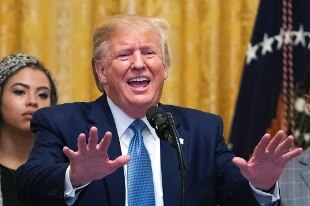- Turkey is about to invade northern Syria. The Kurds: "We will resist at all costs"
- The Kurdish commander Roja: yes to a Syrian democratic confederation
- Syria and Turkey, the crisis scenario
Share
October 07, 2019In the space of a few hours, President Donald Trump went from announcing the American retreat from the Syrian border, abandoning the Kurdish allies, to threaten the Ankara government not to go too far with military initiatives against the Kurds themselves, which the Turks consider them as terrorists; otherwise, the president threatened, "we will overwhelm their economy".The correction of the route was caused by the Pentagon's surprise reaction and negative by the Republicans themselves who, en masse, called Trump's decision a "grave error", a "disastrous" move, because it abandons the allies who were fighting against the jihad Islamic. The first to express concern was conservative Senator Lindsey Graham, Trump's loyalist and golf companion.
Speaking to Fox News, the senator commented: "If I hadn't seen Trump's name on the tweet, I would have thought it was the motivation used by Obama to justify abandoning Iraq." "It is a great victory for Iran and Assad, and for ISIS - added the senator - it is a short-sighted and irresponsible decision. I will do everything in my power to sanction Turkey if they even take one step to attack the Kurds. I am ready to cut off relations with Turkey. I believe that much of Congress thinks the same way. " Graham has threatened bipartisan sanctions and a request for suspension by NATO against the Ankara government. If the Republican in the House, Liz Cheley, called the withdrawal a "catastrophic mistake" and Senator Marco Rubio a "grave mistake with implications going beyond Syria", Senator Mitt Romney branded Trump's announcement as "treason ". "It is like saying - he adds - that America is not a reliable ally, it favors the resurgence of ISIS and heralds another humanitarian disaster". On the wave of harsh and compact reactions, the president corrected his position, threatening Ankara: "If Turkey does something that, in my great and unparalleled wisdom, I will consider beyond the limit, I will completely destroy the Turkish economy (I have already done!)".
A Defense Department official noted that the president's tweet removed any ambiguity about whether Trump supported a Turkish attack on the Kurds: the Pentagon pointed out that it would not support a Turkish military invasion of Syria; and that it will not be a "generalized withdrawal", but only the movement of some men and a limited area. "In fact - said an American officer - our position in the north-east of Syria does not change".
Secretary of Defense Mark Esper and the Mark Milley joint military camp, a spokesman said, believe that "unilateral actions will create a risk for Turkey". The concern is that, if called to defend themselves from attacks, the Kurds will abandon control of the prisons where ten thousand Islamic "fighters" are locked up, effectively putting them in a position to escape. Despite the partial correction, Trump is determined to carry forward the plan to return the soldiers home, in the name of a "first the American borders" that his supporters like. Against the Kurds, historical allies in the fight against Islamic jihad, Trump showed little sympathy. In a tweet he wrote: "They fought for us but it is also true that they were paid to do this." The message is addressed above all to the allies, starting with the European ones: Washington wants to close the purse strings. "We had to stay in Syria for only thirty days and we have been there for years. Holding thousands of terrorists in jail is costing us too much, it is a problem that the Allies must solve now."
It is not the first tear in the Middle East made by the White House. When Trump announced the American withdrawal from Syria in winter, Defense Secretary Jim Mattis had resigned, followed soon after by Brett McGurk, a special envoy in the fight against the 'Islamic State'. "When I became president - Trump explained this time - Islamic terrorism was on the rise. With me it was completely eradicated." But it is on this point that Republicans, Democrats, parts of the administration and the allies diverge. The fear is that the American exit could make years of fighting terrorism in the area in vain.

